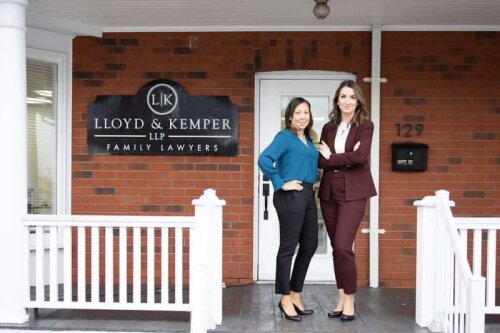Best Collaborative Law Lawyers in Whitby
Share your needs with us, get contacted by law firms.
Free. Takes 2 min.
Free Guide to Hiring a Family Lawyer
List of the best lawyers in Whitby, Canada
About Collaborative Law in Whitby, Canada
Collaborative Law is a voluntary, client-centered approach to resolving legal disputes, most commonly used in family law matters such as separation and divorce. In Whitby, Ontario, Collaborative Law offers an alternative to traditional court proceedings by encouraging cooperation, open communication, and mutually beneficial resolutions. Parties and their lawyers commit to settling issues outside of court through negotiation and problem-solving. This process often involves other professionals, such as financial advisors or family counselors, to ensure a fair and comprehensive agreement is reached.
Why You May Need a Lawyer
Legal issues-especially those involving family, property, and finances-can be complicated and emotionally charged. Hiring a Collaborative Law lawyer in Whitby can be helpful for various reasons:
- Separation or Divorce: Couples who want to end their relationship amicably and avoid litigation may benefit from collaborative legal guidance.
- Parenting Arrangements: Parents in disagreement about custody, access, or parenting time may achieve child-focused agreements with professional assistance.
- Division of Property: Disputes over the division of assets or debts can be resolved more smoothly through collaborative processes.
- Support Issues: Matters involving child or spousal support can be negotiated constructively.
- Complex Family Dynamics: Blended families, unique financial circumstances, or other complexities often require tailored solutions facilitated by legal professionals.
- Avoiding Court: Those who prefer to settle disputes privately while maintaining respectful relationships may opt for Collaborative Law.
Local Laws Overview
Whitby operates under Ontario's legal system, which recognizes and supports the Collaborative Law process, particularly with respect to family law. Key aspects of the local legal landscape include:
- Participation Agreements: All parties and their lawyers sign a participation agreement, committing to resolve issues outside court.
- Confidentiality: Collaborative Law meetings and discussions are kept confidential and cannot be used in court if the process ends.
- Voluntary Process: Participation is entirely voluntary, and either party may withdraw at any time.
- Disclosure Requirements: Full and honest financial and personal disclosure is essential for building trust and reaching fair agreements.
- Non-Adversarial Approach: Lawyers act as problem-solvers and facilitators, not as adversaries.
- Interdisciplinary Collaboration: Local professionals, such as mental health experts and financial advisors, may be involved to address all aspects of the dispute.
Frequently Asked Questions
What is Collaborative Law?
Collaborative Law is a voluntary process where parties and their lawyers work together outside of court to resolve disputes in a respectful, transparent, and cooperative manner.
How is Collaborative Law different from mediation or litigation?
Unlike litigation, Collaborative Law is non-adversarial and aims for win-win solutions without going to court. Mediation involves a neutral third party helping to facilitate agreement, while in Collaborative Law, each party has their own lawyer but agrees to cooperate and settle outside of court.
What kinds of disputes can be resolved through Collaborative Law?
Collaborative Law is commonly used for family law issues such as separation, divorce, child custody, parenting arrangements, and division of property. It can also apply to other civil disputes.
Do I still need a lawyer in the Collaborative process?
Yes, each party is represented by their own specially trained Collaborative Law lawyer to provide legal advice, guidance, and advocacy throughout the process.
What happens if we can't reach an agreement?
If an agreement cannot be reached, the Collaborative process ends, and both lawyers must withdraw. You may then proceed to court with new legal representation.
Are agreements reached in Collaborative Law legally binding?
Yes, once an agreement is reached, it can be formalized in a legal contract or incorporated into a court order, making it binding and enforceable.
Is everything discussed during the process confidential?
Yes, discussions and disclosures made during the Collaborative process are confidential and cannot be used as evidence in court should the process end without agreement.
How long does the Collaborative process usually take?
The timeline varies depending on the parties' circumstances and the complexity of the issues, but Collaborative Law often resolves disputes faster than traditional litigation.
What if I feel intimidated or unequal during the process?
Collaborative Law is designed to ensure a safe, respectful environment. Lawyers and, when needed, neutral professionals help balance power dynamics and safeguard the interests of both parties.
How much does Collaborative Law cost?
Costs vary based on the issues involved and the professionals required, but Collaborative Law is generally less expensive than going to court due to its efficiency and reduced conflict.
Additional Resources
If you are considering Collaborative Law in Whitby, the following resources and organizations may be helpful:
- Ontario Association of Collaborative Professionals (OACP)
- Collaborative Practice Durham Region
- Ontario Ministry of the Attorney General - Family Law Information Centres
- Durham Region Law Association
- Legal Aid Ontario (eligibility may apply)
- Family Justice Services in Ontario
Next Steps
If you believe Collaborative Law is the right approach for your situation in Whitby, consider the following steps:
- Contact a Collaborative Law lawyer in Whitby for an initial consultation to discuss your case.
- Ask about the lawyer’s experience and training in Collaborative Law.
- Discuss your goals and concerns openly with your lawyer to determine if the Collaborative process is suitable.
- Be prepared to fully disclose relevant information, as honesty and transparency are key to successful outcomes.
- If appropriate, involve other professionals recommended by your lawyer (such as financial or child specialists) to address specific issues.
- Review and sign a participation agreement to begin the process.
- Attend collaborative meetings with an open mind, focusing on cooperation, respect, and finding mutually beneficial solutions.
- If the process concludes successfully, work with your lawyer to formalize your agreement and ensure it is legally binding.
Taking these steps can help you manage your legal issues in a way that prioritizes respect, privacy, and lasting solutions for everyone involved.
Lawzana helps you find the best lawyers and law firms in Whitby through a curated and pre-screened list of qualified legal professionals. Our platform offers rankings and detailed profiles of attorneys and law firms, allowing you to compare based on practice areas, including Collaborative Law, experience, and client feedback.
Each profile includes a description of the firm's areas of practice, client reviews, team members and partners, year of establishment, spoken languages, office locations, contact information, social media presence, and any published articles or resources. Most firms on our platform speak English and are experienced in both local and international legal matters.
Get a quote from top-rated law firms in Whitby, Canada — quickly, securely, and without unnecessary hassle.
Disclaimer:
The information provided on this page is for general informational purposes only and does not constitute legal advice. While we strive to ensure the accuracy and relevance of the content, legal information may change over time, and interpretations of the law can vary. You should always consult with a qualified legal professional for advice specific to your situation.
We disclaim all liability for actions taken or not taken based on the content of this page. If you believe any information is incorrect or outdated, please contact us, and we will review and update it where appropriate.












